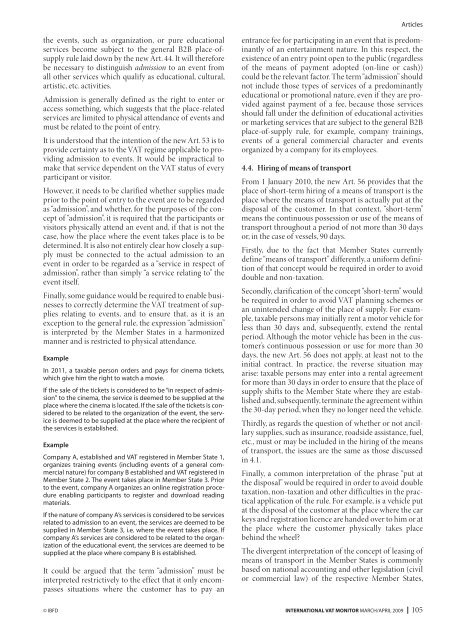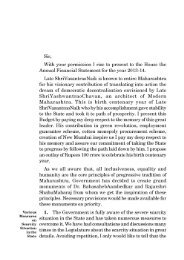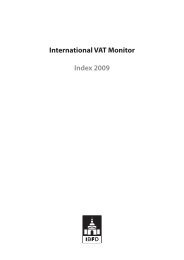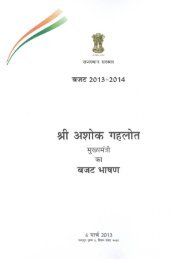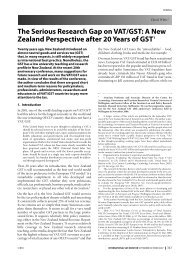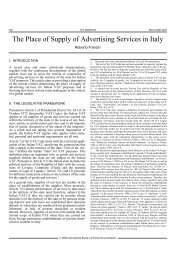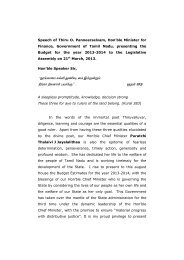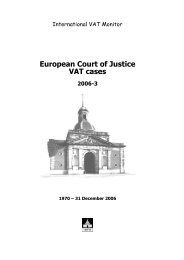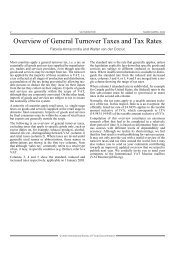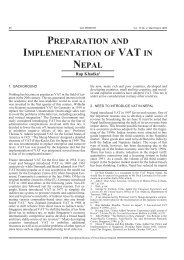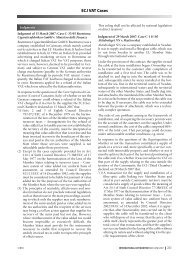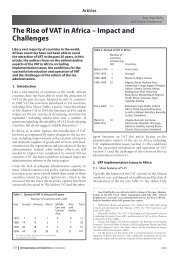The New EU Place-of-Supply Rules from a ... - empcom.gov.in
The New EU Place-of-Supply Rules from a ... - empcom.gov.in
The New EU Place-of-Supply Rules from a ... - empcom.gov.in
You also want an ePaper? Increase the reach of your titles
YUMPU automatically turns print PDFs into web optimized ePapers that Google loves.
the events, such as organization, or pure educational<br />
services become subject to the general B2B place-<strong>of</strong>supply<br />
rule laid down by the new Art. 44. It will therefore<br />
be necessary to dist<strong>in</strong>guish admission to an event <strong>from</strong><br />
all other services which qualify as educational, cultural,<br />
artistic, etc. activities.<br />
Admission is generally def<strong>in</strong>ed as the right to enter or<br />
access someth<strong>in</strong>g, which suggests that the place-related<br />
services are limited to physical attendance <strong>of</strong> events and<br />
must be related to the po<strong>in</strong>t <strong>of</strong> entry.<br />
It is understood that the <strong>in</strong>tention <strong>of</strong> the new Art. is to<br />
provide certa<strong>in</strong>ty as to the VAT regime applicable to provid<strong>in</strong>g<br />
admission to events. It would be impractical to<br />
make that service dependent on the VAT status <strong>of</strong> every<br />
participant or visitor.<br />
However, it needs to be clarified whether supplies made<br />
prior to the po<strong>in</strong>t <strong>of</strong> entry to the event are to be regarded<br />
as “admission”, and whether, for the purposes <strong>of</strong> the concept<br />
<strong>of</strong> “admission”, it is required that the participants or<br />
visitors physically attend an event and, if that is not the<br />
case, how the place where the event takes place is to be<br />
determ<strong>in</strong>ed. It is also not entirely clear how closely a supply<br />
must be connected to the actual admission to an<br />
event <strong>in</strong> order to be regarded as a “service <strong>in</strong> respect <strong>of</strong><br />
admission”, rather than simply “a service relat<strong>in</strong>g to” the<br />
event itself.<br />
F<strong>in</strong>ally, some guidance would be required to enable bus<strong>in</strong>esses<br />
to correctly determ<strong>in</strong>e the VAT treatment <strong>of</strong> supplies<br />
relat<strong>in</strong>g to events, and to ensure that, as it is an<br />
exception to the general rule, the expression “admission”<br />
is <strong>in</strong>terpreted by the Member States <strong>in</strong> a harmonized<br />
manner and is restricted to physical attendance.<br />
Example<br />
In 2011, a taxable person orders and pays for c<strong>in</strong>ema tickets,<br />
which give him the right to watch a movie.<br />
If the sale <strong>of</strong> the tickets is considered to be “<strong>in</strong> respect <strong>of</strong> admission”<br />
to the c<strong>in</strong>ema, the service is deemed to be supplied at the<br />
place where the c<strong>in</strong>ema is located. If the sale <strong>of</strong> the tickets is considered<br />
to be related to the organization <strong>of</strong> the event, the service<br />
is deemed to be supplied at the place where the recipient <strong>of</strong><br />
the services is established.<br />
Example<br />
Company A, established and VAT registered <strong>in</strong> Member State 1,<br />
organizes tra<strong>in</strong><strong>in</strong>g events (<strong>in</strong>clud<strong>in</strong>g events <strong>of</strong> a general commercial<br />
nature) for company B established and VAT registered <strong>in</strong><br />
Member State 2. <strong>The</strong> event takes place <strong>in</strong> Member State 3. Prior<br />
to the event, company A organizes an onl<strong>in</strong>e registration procedure<br />
enabl<strong>in</strong>g participants to register and download read<strong>in</strong>g<br />
materials.<br />
If the nature <strong>of</strong> company A’s services is considered to be services<br />
related to admission to an event, the services are deemed to be<br />
supplied <strong>in</strong> Member State 3, i.e. where the event takes place. If<br />
company A’s services are considered to be related to the organization<br />
<strong>of</strong> the educational event, the services are deemed to be<br />
supplied at the place where company B is established.<br />
It could be argued that the term “admission” must be<br />
<strong>in</strong>terpreted restrictively to the effect that it only encompasses<br />
situations where the customer has to pay an<br />
© IBFD INTERNATIONAL VAT MONITOR MARCH/APRIL 2009<br />
Articles<br />
entrance fee for participat<strong>in</strong>g <strong>in</strong> an event that is predom<strong>in</strong>antly<br />
<strong>of</strong> an enterta<strong>in</strong>ment nature. In this respect, the<br />
existence <strong>of</strong> an entry po<strong>in</strong>t open to the public (regardless<br />
<strong>of</strong> the means <strong>of</strong> payment adopted (on-l<strong>in</strong>e or cash))<br />
could be the relevant factor. <strong>The</strong> term “admission” should<br />
not <strong>in</strong>clude those types <strong>of</strong> services <strong>of</strong> a predom<strong>in</strong>antly<br />
educational or promotional nature, even if they are provided<br />
aga<strong>in</strong>st payment <strong>of</strong> a fee, because those services<br />
should fall under the def<strong>in</strong>ition <strong>of</strong> educational activities<br />
or market<strong>in</strong>g services that are subject to the general B2B<br />
place-<strong>of</strong>-supply rule, for example, company tra<strong>in</strong><strong>in</strong>gs,<br />
events <strong>of</strong> a general commercial character and events<br />
organized by a company for its employees.<br />
4.4. Hir<strong>in</strong>g <strong>of</strong> means <strong>of</strong> transport<br />
From 1 January 2010, the new Art. provides that the<br />
place <strong>of</strong> short-term hir<strong>in</strong>g <strong>of</strong> a means <strong>of</strong> transport is the<br />
place where the means <strong>of</strong> transport is actually put at the<br />
disposal <strong>of</strong> the customer. In that context, “short-term”<br />
means the cont<strong>in</strong>uous possession or use <strong>of</strong> the means <strong>of</strong><br />
transport throughout a period <strong>of</strong> not more than 0 days<br />
or, <strong>in</strong> the case <strong>of</strong> vessels, 90 days.<br />
Firstly, due to the fact that Member States currently<br />
def<strong>in</strong>e “means <strong>of</strong> transport” differently, a uniform def<strong>in</strong>ition<br />
<strong>of</strong> that concept would be required <strong>in</strong> order to avoid<br />
double and non-taxation.<br />
Secondly, clarification <strong>of</strong> the concept “short-term” would<br />
be required <strong>in</strong> order to avoid VAT plann<strong>in</strong>g schemes or<br />
an un<strong>in</strong>tended change <strong>of</strong> the place <strong>of</strong> supply. For example,<br />
taxable persons may <strong>in</strong>itially rent a motor vehicle for<br />
less than 0 days and, subsequently, extend the rental<br />
period. Although the motor vehicle has been <strong>in</strong> the customer’s<br />
cont<strong>in</strong>uous possession or use for more than 0<br />
days, the new Art. does not apply, at least not to the<br />
<strong>in</strong>itial contract. In practice, the reverse situation may<br />
arise: taxable persons may enter <strong>in</strong>to a rental agreement<br />
for more than 0 days <strong>in</strong> order to ensure that the place <strong>of</strong><br />
supply shifts to the Member State where they are established<br />
and, subsequently, term<strong>in</strong>ate the agreement with<strong>in</strong><br />
the 0-day period, when they no longer need the vehicle.<br />
Thirdly, as regards the question <strong>of</strong> whether or not ancillary<br />
supplies, such as <strong>in</strong>surance, roadside assistance, fuel,<br />
etc., must or may be <strong>in</strong>cluded <strong>in</strong> the hir<strong>in</strong>g <strong>of</strong> the means<br />
<strong>of</strong> transport, the issues are the same as those discussed<br />
<strong>in</strong> 4.1.<br />
F<strong>in</strong>ally, a common <strong>in</strong>terpretation <strong>of</strong> the phrase “put at<br />
the disposal” would be required <strong>in</strong> order to avoid double<br />
taxation, non-taxation and other difficulties <strong>in</strong> the practical<br />
application <strong>of</strong> the rule. For example, is a vehicle put<br />
at the disposal <strong>of</strong> the customer at the place where the car<br />
keys and registration licence are handed over to him or at<br />
the place where the customer physically takes place<br />
beh<strong>in</strong>d the wheel?<br />
<strong>The</strong> divergent <strong>in</strong>terpretation <strong>of</strong> the concept <strong>of</strong> leas<strong>in</strong>g <strong>of</strong><br />
means <strong>of</strong> transport <strong>in</strong> the Member States is commonly<br />
based on national account<strong>in</strong>g and other legislation (civil<br />
or commercial law) <strong>of</strong> the respective Member States,<br />
10


